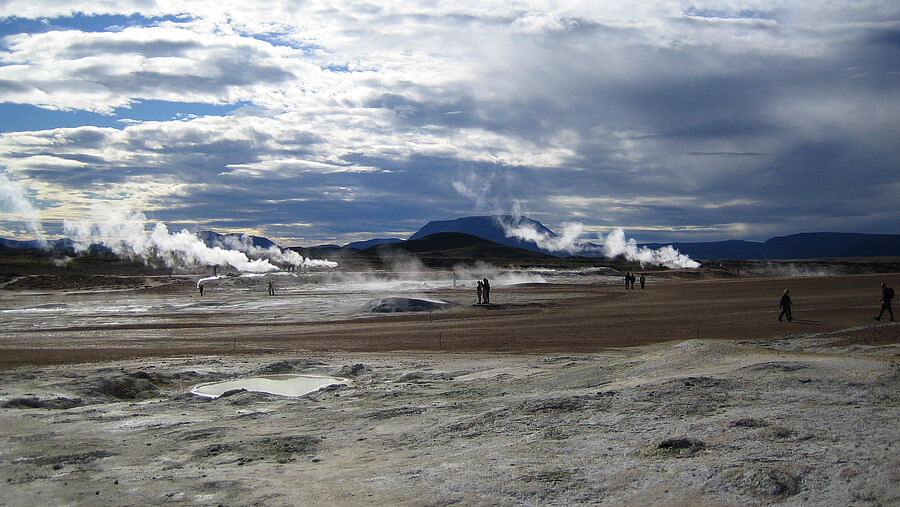Geosciences
(Bachelor of Science)
Profile
German HZB: none
International application: German C1
Find out more
Auslandsaufenthalt möglich, aber nicht verpflichtend.
Short Description
Geosciences deals with processes that shape and change Earth on a variety of spatial and temporal scales. To enhance the understanding of these processes, geoscientists use methods such as examination and experimentation in the field and laboratory, big data analytics, and computer simulations. Geosciences play a central role in addressing vital questions of global significance, including the assessment of georisks and the impacts of future climate change.
The results of these efforts will have consequences for physical, geochemical and ecological processes at the Earth’s surface and the exploration, development and use of subsoil, the Earth’s surface and natural resources (water, soil, energy resources, metal ores, rocks and earth). Addressing these issues requires the development of new materials and procedures, especially in the fields of energy efficiency and environmental protection.
Hannover is an important centre of Geosciences in Germany, home to institutions such as the Federal Institute for Geosciences and Natural Resources (BGR), the State Authority for Mining, Energy and Geology (LBEG), and other research institutions, as well as numerous businesses working in this field. Close cooperation with these institutions offers numerous career opportunities in the region.
Course Content
- Specialisation in soil science
- Specialisation in geology
- Specialisation in mineralogy/geochemistry
The first four semesters of the bachelor’s programme are devoted to the scientific and geoscience principles required for the rest of the course. These include on the one hand physics, mathematics, chemistry, biology, and on the other the “traditional” Geosciences of geology, mineralogy and soil science. These disciplines form the basis for understanding the complex interrelations and processes in “system earth”. Afterwards, students round off the knowledge they have acquired and apply it to specific problems in earth sciences. In the third year students specialize by choosing core areas for more intensive scientific study. These subjects are mainly modular and can be chosen freely.
To study Geosciences, you should have good observation and concentration skills, enthusiasm for conducting experiments and for working in a laboratory, the ability to work in a team, an interest in technical matters, as well as a good background in science. A certain level of physical fitness is needed for the participation in modules involving field trips and excursions.
Graduates in Geosciences have job opportunities in a variety of career fields. Geoscientists work for federal and state authorities, engineering companies, environmental agencies and laboratories, consultant offices, and for companies engaged in soil mapping, soil analysis and soil restoration and in the exploitation of natural resources and the analysis and treatment of contaminated sites. They are also employed at universities and external research institutes, as well as in museums.
- Geosciences (Master of Science)
- Landscape Sciences (Master of Science)
- Philosophy of Science (Master of Arts)
- Water and Environment (distance learning) (Master of Science)
Under certain conditions, admission to the following Master's programme is also possible. More detailed information can be found in the respective admission regulations. If you have any questions, please contact the course advice of the desired Master's programme:
- Environmental Planning and Territorial Development - Major Territorial Development (Master of Science)
- Water Resources and Environmental Management (Master of Science)
Admission Requirements
This degree programme is admission-free.
If you did not graduate from a German school nor have a German higher education entrance qualification (for example, the Abitur), a language certificate proving your knowledge of German is required for the application and enrollment.
Application Deadlines
1 June – 15 July of the year for the winter semester
- First-year students (application for the 1st semester) can only apply for the winter semester.
- Students resuming their studies and transfer students (application for a higher semester) can also apply for the summer semester (1 December - 15 January).
- Requirements for applications from non-EU countries:
- VPD from uni-assist OR a passed assessment test (Feststellungsprüfung) of a preparatory foundation course (Studienkolleg)
- Applications for the Studienkolleg must be submitted by 15 July.
Leibniz UNInsights – The student podcast
Please note that activating the video will result in the transfer of data to the respective provider. Further information can be found in our privacy policy.
Play video
Geosciences (B.Sc.) - Fritz & Vivienne talks about their studies
Please note that activating the video will result in the transfer of data to the respective provider. Further information can be found in our privacy policy.
Play video
Do you have questions about studying? We are happy to help!

30167 Hannover

30167 Hannover









